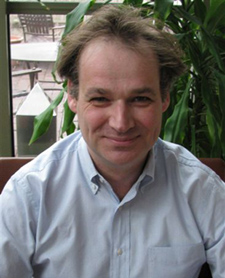Chief Clinical Scholar, Dr. Neil Renwick received his medical degree from the University of Otago, New Zealand in 1993 and spent the following three years working as a medical officer in Australia, Papua New Guinea, and Thailand. “It might be a New Zealand thi ng, but OE (oversees experience) is a common rite of passage.” From 1997-2001, he was a PhD candidate in Virology, studying the Kaposi Sarcoma Herpesvirus at the University of Amsterdam, Netherlands. In 2001, he began a combined pathology residency and postdoctoral research position at Columbia University Medical Center. While there, he was awarded the College of American Pathology Foundation Scholars Award and an NBC Fellowship in Biodefense and Emerging Infectious Diseases to work on pathogen detection and discovery techniques.
ng, but OE (oversees experience) is a common rite of passage.” From 1997-2001, he was a PhD candidate in Virology, studying the Kaposi Sarcoma Herpesvirus at the University of Amsterdam, Netherlands. In 2001, he began a combined pathology residency and postdoctoral research position at Columbia University Medical Center. While there, he was awarded the College of American Pathology Foundation Scholars Award and an NBC Fellowship in Biodefense and Emerging Infectious Diseases to work on pathogen detection and discovery techniques.
Sensing the importance of post-transcriptional genetic regulation in disease, he joined the Laboratory of RNA Molecular Biology as a Clinical Scholar to work with Dr. Thomas Tuschl, analyzing the expression of microRNAs in patient tissue and cell samples, and testing if misexpression of microRNAs is linked to disease progression. The discovery that miRNAs are expressed in viruses — in particular, members of the herpesvirus family — also came out of the Tuschl lab, catching Dr. Renwick’s interest as a virologist. Dr. Tuschl has identified numerous components involved in RNA interference and has elucidated how miRNAs work to regulate gene expression in the cell. Dr. Renwick is working on developing miRNA diagnostic tools to evaluate the contribution of this gene family in disease, and continue to identify new miRNA genes.
Dr. Renwick explained how working in the Tuschl lab has provided a new and exciting research experience. “Dr. Tuschl is a PhD scientist and chemist and I have a clinical background. It has turned out to be an unexpected but amazing combination. The entire lab is very diverse in their expertise. We have a bioinformatician, a cell biologist, biochemists, cell biologists, chemists, as well as medical doctors with different training. This creates an environment of great collaboration and teamwork. What it also allows for is more control over our work. We are not dependent on outside people because the lab can provide all of the elements required.”
When asked about his experience at Rockefeller University Center for Clinical and Translational Science, Dr. Renwick replied, “Rockefeller University is the pinnacle for research. The environment is heads and shoulders above the other institutions I have been at in terms of supporting and encouraging research work. I saw a documentary about Rockefeller University when I was in New Zealand, so it is quite amazing to me that I am now working here. As a clinical scholar I am receiving individualized training, as well as the opportunity to develop new interests and receive constructive critiques from experts in my field.”
In 2008, Dr. Renwick was selected to receive a pilot project award from the Center for Clinical and Translational Science to help fund his continued studies. In addition, he was appointed to the Chief Clinical Scholar, a position for which he has much enthusiasm. “The Clinical Scholars program is great and being the Chief is brilliant because I can focus on the science that interests me most. (laughs) It's fascinating to work with such an exciting group!”
March 4, 2009
Meet the Scholar: Neil Renwick, M.D., Ph.D.
By Jennifer Spada
